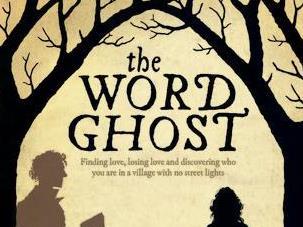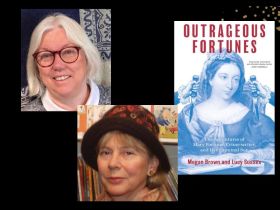As The Word Ghost’s heroine, Rebecca Budde, lets us into her world she confesses, ‘When you’re nearly sixteen the world is a weird enough place, but there are some things you know with great certainty, no questions needed, no inner doubt.’
This novel is the tale of the unravelling of such certainties. The liminal and passionate turns of adolescence, the Romantic-era ghost residing in her wardrobe, and the paths Rebecca crosses with a motley crew of characters, all play a part in her altering perspective. The Word Ghost is the story of a young woman and her exploits as she is coming to glean that her knowledge and feelings (her certainties) are relative and shift with the caprice of the universe. Fiction and reality, life and death, love and hate bleed into each other in this captivating read that explores the wonders of mind and heart.
When we enter Rebecca’s orbit it is 1973, she is living in Wye, England, and in the throes and fizz of what she considers to be love, revelling in its delectable halcyon air. Rebecca is somewhat wilful, and the manner in which she colours her life narrative with hyperbolic cadences derived from her bookish education provides for entertaining reading (even though we recognise such fervour for fancies could be dangerous for her wellbeing). Take for example her description of her and Dave kissing:
My heart flew up to the ceiling and lodged in the cracks by the light. I had risen about three feet off the ground and was actually floating down the hallway. I was full of light, bathed in teenage love. I was Henry the Eighth and all of his wives. I was everyone who ever lived and nothing in my whole life had ever been more exciting.
It is Rebecca’s father’s taking up of a post at a parish in Brightley that uproots her from her comfort zone and with which she initially takes umbrage. But with the spectre of Algernon Keats–cousin of the renowned poet John Keats–entering the fold, tending to his own unfinished business, Rebecca’s world interestingly becomes marked with more questions and more doubts as indistinct things begin to permeate her world. As we follow the humbling and strengthening of Rebecca’s character, Paice deftly and non-pretentiously employs descriptions of the landscape and architecture of Rebecca’s new homestead to invoke the spirit of Romanticism’s wonder and sublime and dashes of its darker gothic thread. At times, it does feel that Rebecca is wandering through her new environs Wordsworthian-like, lonely as a cloud, as they make their imprint on her. The Victorian tradition also gets some play, especially influences from the Brontes, as Rebecca negotiates her spiritual becoming and her conception of romantic love.
Just as Rebecca is learning that poetry is a vehicle with which to make sense of ambiguity and read in other ways, Paice applies it to her writing. Her usually minimal style allows for easy reading and an energetic pace. Yet her prose is also fecund, seemingly effortlessly, with both subtle and striking symbols that add a certain je ne sais quoi to the surrounding events–they’re somewhat impressionist strokes that imbue a sense of the wondrous for the reader. There is also a mix of different voices that appear in the narrative, which add an intriguing layer of questioning at times for the reader: Are these ghosts indeed empirically real or an invention of Rebecca’s mind? However, sometimes the confusing origin of some voices can prove to be jarring rather than a value-adding effect.
Algernon, his eerie sister Augusta, and Alex March–the living Byronic artist whose intentions are mysterious–serve as a triad of sorts whose unconscious function is to aid Rebecca in her self-awareness through their interactions, and while this generally works, it would have been more effective to have these characters fleshed out a bit more, especially Algernon, who does command a few powerful and humorous scenes but is largely underplayed.
The Word Ghost is well paced for the most part, its energy keeps the pages turning. The mid-section does lose its way a bit–although the romance and verve of Paice’s refreshing writing style almost make this unnoticeable–and the charged momentum picks up again nearing the conclusion. Overall, readers will roll on with the suspenseful mood carried by equal light and dark hues, and those familiar with the Romanticism and Victorian literary genres may take away a little extra.
As Rebecca explores and tweaks her moral and sexual compasses, and sifts through the contrived and authentic to sharpen her sense of identity, readers will find themselves immersed in an engrossing caper about reading and the stories one can carve out from everyday weirdness.
Rating: 3 ½ out of 5 starsThe Word Ghost
By Christine Paice
Paperback
368 pages
$29.99
9781743318263
Allen & Unwin





